Author:Fudan University Release date:2021-11-03 16:07:27Source:发展研究院英文

With the theme of "Recovery and Resilience: Asia's Role in a Sustainable Future", Shanghai Forum 2021 kicked off at Fudan University on October 29. Over 2,200 guests from think tanks, universities, academic institutions, enterprises, government agencies and media from more than 40 countries joined the forum either online or offline.
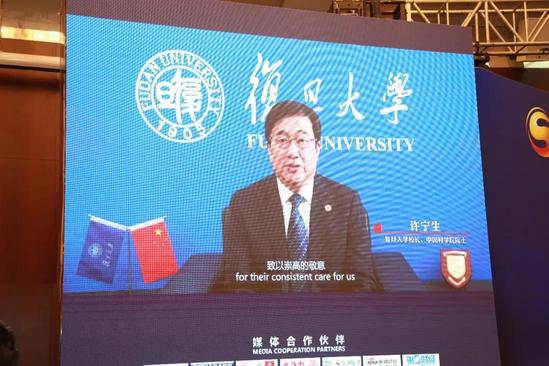
Xu Ningsheng
President of Fudan University and Academician of Chinese Academy of Sciences
Xu Ningsheng pointed out in his opening remarks that the world is undergoing profound changes unseen in a century. The theme of this year's forum is a deliberate choice, which reflects the shared expectations for development, governance and security in the face of the ongoing normalization of COVID-19 prevention and control. We need to make Asia’s voice heard and integrate global perspectives through Shanghai Forum. Seeking common ground while shelving differences represents our resilience in accelerating the full recovery of Asia and the world.
Xu said that as the host of Shanghai Forum, Fudan has undertaken the mission of this era to combine discipline construction with national development and human destiny. As we march ahead, the pressing issues of the times have stimulated the generation of new thoughts and theories for the development of universities and the construction of disciplines, while scientific research and innovation will provide answers to these issues. Meanwhile, the report on the driving forces of national development recently released by Fudan Development Institute has put forwarded a systemic framework of understanding the dynamics of national development. We welcome scholars from all over the world to participate in the research of this important issue, share their unique development experiences, and jointly promote the theoretical research on national and human development in the new era. He also hopes Shanghai Forum 2021 can pool more ideas and wisdom from all over the world through exchanges and communication.
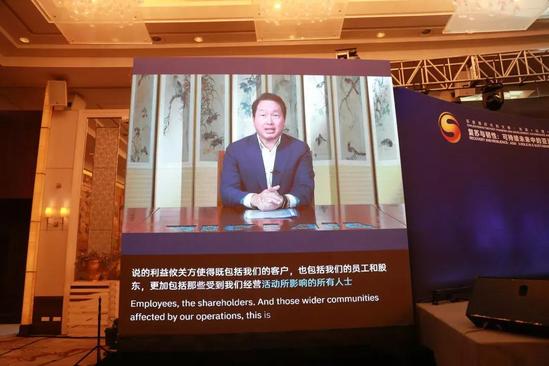
Chey Tae-won
Chairman and CEO of SK Group
Chey Tae-won, said in his opening remarks that global issues such as geopolitical and social tensions, economic turmoil and the ongoing environmental crisis still need to be addressed in the face of COVID-19, and he called on all the parties to work together to build a future that is prosperous, resilient and sustainable for all. Chey believed running eco-friendly businesses and generating value to society is the best way to grow with the stakeholders and the only way to guarantee the resilience and long-term sustainability of their operations. Asia demonstrated remarkable resilience during the pandemic, and it is now taking a lead in the global effort to tackle climate change, with China being a great example. We need to step up public-private collaboration and work together as one, transcending national boundaries, to protect our environment.
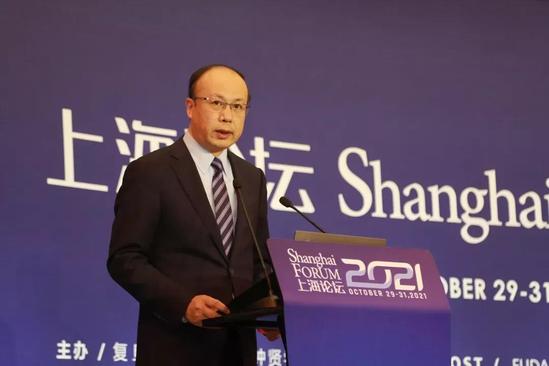
Chen Zhimin
Vice President of Fudan University
As COVID-19 pandemic continues to ravage the world, it is more urgent than ever for us to communicate, understand, unite and cooperate with each other, said Chen Zhimin, who moderated the opening ceremony. He hopes that Shanghai Forum will pool wisdom and views for the future development of Asia and the world with broader vision and a focus on major trends. Today, China is making steady progress for national rejuvenation. As a key contributor and facilitator of world economic growth and global governance, China is rediscovering its role in the world, and the world needs to rediscover China as well.

Park In-Kook
President, Chey Institute for Advanced Studies;
Former Ambassador, Permanent Representative of the Republic of Korea to the United Nations;
Former President, Korea Foundation for Advanced Studies
Park In-Kook presided over the keynote speech session. He pointed out Asia's economy has continued to grow steadily and rebounded more strongly than other regions, under the pressure of common challenges such as the global public health crisis and environmental issues, which demonstrates the impetus of Asia as a global center of technology and innovation. As a good starting point, Shanghai Forum pools wisdom worldwide and proposes shared vision for future development that benefits both Asia and the world at large.

Jefferey Sachs
University Professor and Director of the Center for Sustainable Development at Columbia University;
Jefferey Sachs said, we have hundreds of millions of people who have entered poverty and are facing increased hunger and many other humanitarian threats as the result of COVID-19. We are also in a period of tremendous disruption of our lives through digital change, geopolitical change and environmental crisis. He stressed the importance of global cooperation among countries, especially in pandemic prevention and control, world economic order, environmental protection, digital access, high technology, peaceful development, economic assistance to developing countries, tax reform and fintech.

Kishore Mahbubani
Former Ambassador of Singapore to the United Nations;
Founding Dean of the Lee Kuan Yew School of Public Policy at National University of Singapore
Kishore Mahbubani believes that in today's world, China-US relations are influenced by structural forces. Only by deepening cooperation between China and the United States can both countries enjoy promising future development. Facts have proved that hegemonic politics has become a thing of the past and the US strategy of containing China is not feasible. Asian countries should speak out more and urge the US to press the “pause button”. He hopes that western countries can go back to multilateralism, and that US policy makers can realize that we are living in a global community, and that they should cooperate with China on all major issues including climate change and COVID-19.
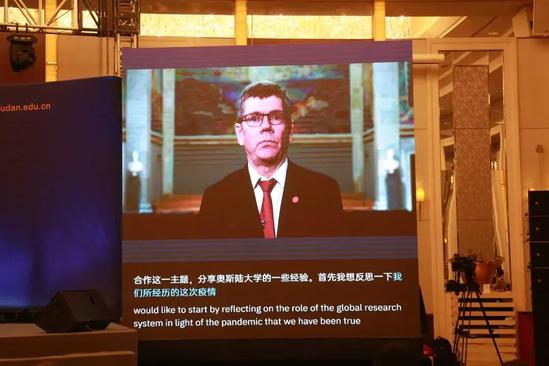
Svein Stølen
Rector, University of Oslo
Svein Stølen congratulated on the 25th anniversary of the Nordic Centre at Fudan University. He said, global problems, such as the pandemic and other sustainability issues will affect people at every corner of the globe. What is clear is that such challenges cannot be solved by one discipline nor one country alone. The University of Oslo believes that connecting people across disciplines, across sectors, across countries is the key to a more sustainable world. The speed and complexity of the crisis has challenged how the universities and scientists work, respond, and participate in handling an ongoing crisis. With strong research-based education and strong students, the University of Oslo aims to secure that knowledge and research is turned into services, methods and products that benefit the society even faster than before.
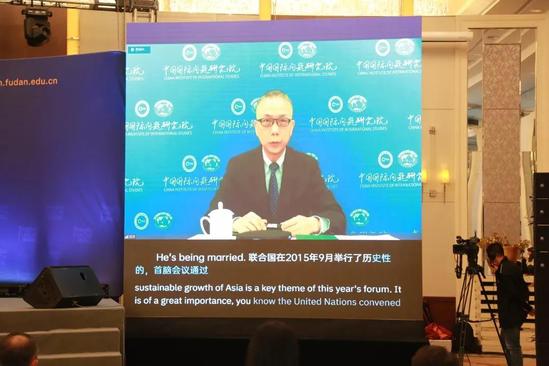
Xu Bu
President, China Institute of International Studies;
Former Ambassador Extraordinary and Plenipotentiary of the People's Republic of China to ASEAN (2015-2018) and to Chile (2018-2020)
Xu Bu stressed that the global sustainable development is facing increasing challenges, with the uneven recovery of the world economy and the spread of the mutated Delta variants around the world. The shortage of global supply chain is becoming more serious. The political and economic center of the world is shifting to the Asia-Pacific region. Sustainable development in Asia requires both the efforts of individual countries and solidarity and cooperation among them. Asian countries should make concerted effort in advancing regional economic and trade cooperation, digital economy, green transformation, high-quality Belt and Road cooperation and the power of Asian civilizations to build an open, inclusive, harmonious, prosperous Asia.

Qian Jun
Executive Dean, Fanhai International School of Finance, Fudan University
Qian Jun shared his views on the development of third-party payment and cross-border payment. By taking e-CNY as an example, he made an introduction to the background of the rapidly developing digital currencies, digital currencies issued by private institutions and central bank digital currencies (CBDCs) and pressing issues of developing CBDCs. He said, although digital RMB can be used in many daily transactions, it still faces technical and regulatory challenges. Currently, there are still two key points about digital RMB, one is the traceability or anonymity of digital RMB, and the other is the coexistence of digital RMB and cash. Central banks around the world are actively preparing for the issuance of CBDCs. Digital currencies will continue to transform current monetary and financial systems.
The opening ceremony was followed with three themed panels which were held during October 29-30. The themes consisted of Scientific & Technological Innovation, Economics & Finance and Global Governance, with scholars and experts from different fields worldwide gathering at 14 roundtables, topics of which included “Roaring in the Deep: Mental Health in Post-COVID-19 Era”, “Technology and Regulation — Good Data Governance for Responsible Digital Finance”, “BRICS Cooperation in a Post-Pandemic Era: New Opportunities, New Impetus and New Challenges”, “How to Reshape China-US Relations”, etc.
Thematic reports of Shanghai Forum 2021

At the opening ceremony, Fudan University Think Tank released the thematic reports of Shanghai Forum 2021. The organizing committee invited leading Fudan scholars from relative fields of study to write thematic reports based on the main theme of the forum “Recovery and Resilience”. The reports have five chapters, covering the area of public health, finance, economy and trade, carbon neutrality and population. The reports focus on key issues in China, Asia and the world that are rising and will be of greater importance in the future, providing Fudan’s perspectives to picture the landscape of the future development, and explore solutions to common challenges.
About Shanghai Forum
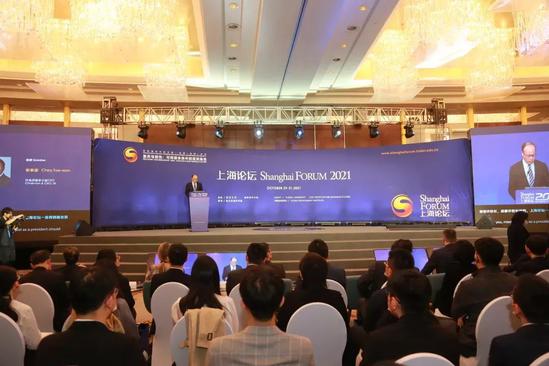
Shanghai Forum, launched in 2005, is known as one of the most famous international forums in China. Co-hosted by Fudan University and Chey Institute for Advanced Studies, organized by Fudan Development Institute, the Forum is a non-governmental and non-profit academic organization, which holds its annual conference in Shanghai. The general theme of Shanghai Forum is “Civilization in the Post-pandemic Era: Development, Governance and Security”, while the annual conference of Shanghai Forum 2021 is themed as “Recovery and Resilience: Asia’s Role in a Sustainable Future”.

Shanghai Forum is dedicated to “Focus on Asia, Explore Pressing Issues, Bring Together Leaders, Promote Interactions, Enhance Cooperation and Seek Consensus”. It endeavors to build an interactive platform for multi-sided communication amongst academic, political, commercial, and press circles, so as to seek consensus on global governance, regional development, public security, culture & civilization, and scientific & technological innovation.